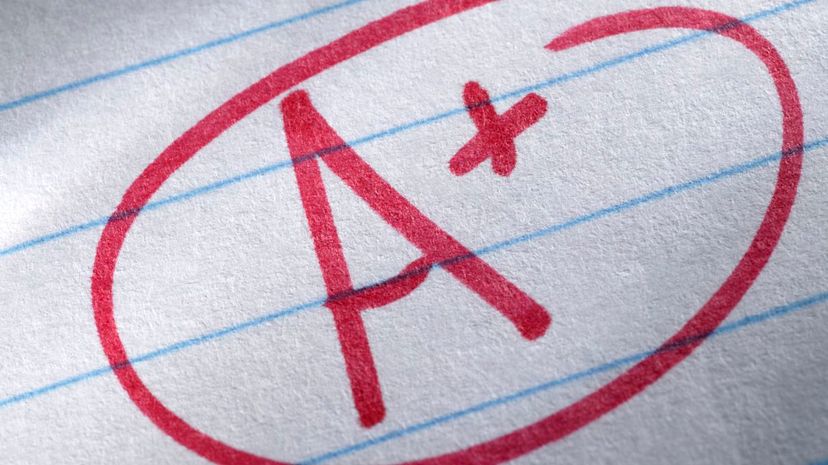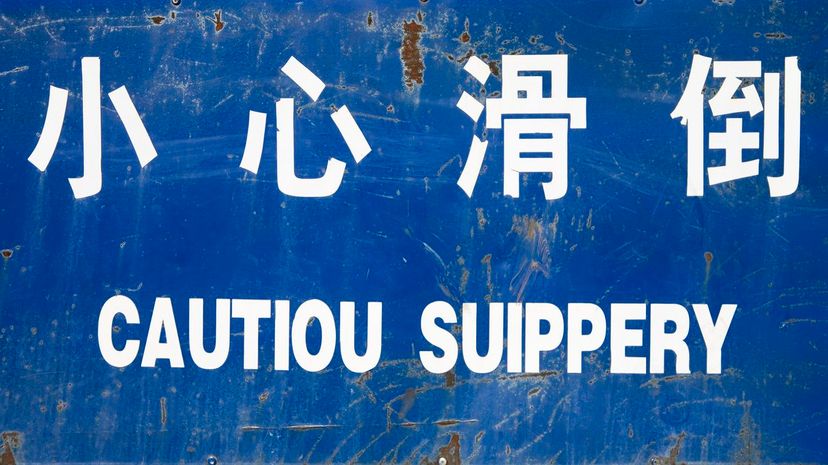
About This Quiz
If you've ever wondered why the English language is so overwhelmingly difficult to master, even as a native English-speaker, you aren't alone. When the topic of teaching literacy is brought up, the main focus falls on reading and writing, while spelling remains an afterthought. Spellcheck is a useful tool for automatically correcting errors, whether they're the result of rushed typing or uncertainty, but it doesn't teach the whys and hows of English spelling.
There are some words that, no matter how many times you use them in a paragraph, you'll always find a challenge to spell accurately. Do you want proof? When F. Scott Fitzgerald wrote "The Great Gatsby," he spelled "yacht" as "yatch" and "upon" as "apon" throughout his entire original manuscript. Thankfully, the use of mnemonic devices and other memorization techniques can go a long way in terms of correcting past spelling patterns (as can gaining an understanding of why certain words are spelled the way they are in the first place.)
Consider these questions like a spelling bee, but without the pressure (and you can do it in the comfort of your own home). All you'll need for this quiz is the ability to make decisions about spelling. If you get an answer right, that's great! If some questions leave you stumped, that's also a positive - now's your chance to learn all about the linguistic and historical factors that determine how a word is spelled.

Despite being the author of modern-day literary classics such as "The Old Man and the Sea," American author Ernest Hemingway was infamous for his consistent misspelling of words such as "moving" and "loving" (he spells them as "moveing" and "loveing" in his manuscripts.)

You can count celebrity chef Jamie Oliver as a member of the "waste versus waist" spelling club. In his case, Oliver opted for the wrong version of the word in a Tweet about "human waist" (he wasn't referring to human anatomy).

The fact that the word "privilege" is spelled without a "D" didn't stop John Cusack from adding one in a 2020 Tweet about U.S. politics. When the error was pointed out, Cusack claimed spellcheck switched his correct spelling to an incorrect version of the word.
Advertisement

You might consider yourself Rihanna's greatest fan, but to her, you're merely one of the "phanz" (at least, according to a Tweet from a previous visit to Singapore.) While the spelling is likely intentional, remember that when it comes to fans, the "F" has it!

If you find yourself defaulting to the word "scissars," at least know you're making errors with the very best of them. Literary great Jane Austen reportedly spelled "scissors" with an "A" in her manuscripts, personal letters and journals.

If you work in the service industry, you'll know that the majority of your time is spent trying to "accommodate" the needs of others. The two "C"s and two "M"s make the spelling particularly challenging (although the mnemonic "two cots need two mattresses" can be a helpful reminder.)
Advertisement

The words "which" and "witch" can be confusing to non-native English speakers because they're examples of a homophone. A homophone is a word that shares the same sound and pronunciation as another word, even though they have different meanings.

The spelling rule, "I" before "E," except after "C," works for many words, but "receive" is not one of them. Receive isn't the only word to defy the rule - the saying was coined after many "IE" words came into fashion all at once.

"Until" and "till" are spelled correctly, "untill" and "til" are not. During the Middle Ages, until was spelled with two "L"s, although this spelling has fallen by the wayside in favor of the single "L."
Advertisement

The word "occurred" has two "C"s and two "R"s, a spelling fact that can be hard to remember. You may find it helpful to know that English words with a stress on the final syllable end with the same two letters (in this case, the word "occur").

The correct spelling of the word, whether it's functioning as a verb or an adjective, is "separate" and not "seperate." Try to think of sepArAte's spelling as AutomAtic - both separate and automatic have two "A"s to help you remember the exact spelling.

Make sure to include the "N" after the "R" when spelling "government." Although many native English speakers have dropped the "N" sound from the spoken word, the correct pronunciation is that of the word "govern."
Advertisement

As it turns out, "definitely" is one the most misspelled words in the English language. What make this basic word so confusing? The way it's pronounced versus the way it's spelled. When said aloud, it is often pronounced as though the word is "def-in-AT-ley" instead of "def-IN-IT-ley."

The unique spelling of the word "pharaoh" comes from its lineage as a word throughout history. From the Hebrew word "par'Åh" to the Greek word "pharaÅ" and then to the Middle English word "pharao," it's clear that the seemingly switched "A" and "O" are here to stay.

Almost all adverbs with an "-ic" ending in the form of a modified adjective end with the letters "-ically," which makes the spelling of the word "publicly" such a difficult one to remember (even for the most dedicated spelling and grammar buffs).
Advertisement

Technically, the month of February should be pronounced as it's spelled, "Fe-brew-airy." Over many years, the pronunciation has changed to "Feb-you-airy," making the extra "R" in February challenging to remember.

You've got to give it to William Shakespeare, he really tried to make his spelling of "Wensday" work (obviously, it wasn't a success). The extra "D" in Wednesday stems from Woden, the Anglo-Saxon god of poetic inspiration and fury, whose official day also happens to be the modern-day "hump day."

A somewhat deceptive word in terms of spelling, the term "dilate" is often mispronounced as though it has three syllables instead of two ("di-AH-late" insead of the correct "di-late") leading to the insertion of an extra "A" after the "I."
Advertisement

The reason "indict" has a silent "C" is mainly stylistic. Even though the word indict was pronounced and spelled as "endite" for 300 years, English scholars changed the spelling to reflect the word's Latin root, "indictare," which means "to proclaim."

In order to spell "sacrilegious" correctly, it's important to know that the term stems from word "sacrilege" (which comes from the Latin words for sacred and and to gather or steal) and not the similar-sounding word "religious."

Even though "ingenious" and "genius" have similar meanings, the words are linguistically unrelated. Ingenious is an adjective and comes from the Latin word "ingeniosus," meaning "natural disposition." Genius is a noun and took on the meaning of "exceptional, natural ability" in the 17th century.
Advertisement

Despite the fact that the word refers to tiny, small and miniature things, the word is actually spelled "minuscule" and not "miniscule." The latter spelling option is used so often that in some cases, "miniscule" is considered a variant on the traditional spelling.

Even the most dedicated English literature scholars will find themselves scratching their heads when it comes to the spelling of the word "onomatopoeia." Considering the word has eight vowels and the "T" is generally pronounced as an "N," we won't fault you for needing to look up this literary term.

It's hard to be "conscientious" when you're trying to spell this word to describe someone who is moral and principled. Because the letters "SC" and and "T" are often to blame for incorrect spelling, a good mnemonic to remember is the "conscientious SCIENTist" is having afternoon tea."
Advertisement

With its confusing initial placement of "ACQ" and the similarly difficult string of vowels and sibilant consonants that follow, the word "acquiesce" is near-impossible to get right on the first try (you may have to acquiesce to repeated practice to master the spelling of this word).

The word "bologna" describes a type of cured meat made from beef and pork that is traditionally made in the small town of Bologna, Italy. As bologna grew in popularity and became a staple in lunchboxes across America, manufacturers chose to spell the word as it's commonly spelled.

We have German botanist Leonhart Fuchs to thank for the spelling of "fuchsia." The fuchsia plant was discovered by fellow botanist Charles Plumier in the latter half of the 17th century and subsequently named after Fuchs.
Advertisement

The word "nauseous" is often used interchangeably with "nauseated," a related word with equally tricky spelling. Although the two words are treated as having the same meaning, "nauseous" refers to something that causes nausea - even though it's typically used to describe the state of feeling sick.

Poor orangutans, if only they knew how much confusion the spelling of their name causes the rest of the world! The long list of incorrect spelling variations of the word "orangutan" are related to differences in pronunciation around the world.

The sneaky "R" in the third syllable of "paraphernalia" makes this word a difficult spelling challenge for even the most seasoned writing professionals. It's frustrating spelling comes down to the difference between how it is commonly pronounced versus how it is spelled.
Advertisement

Even if you're known for having impeccable "rhythm" on the dance floor, you still might struggle to remember the word's tricky spelling. The next time you're stumped trying to spell rhythm, think of this acrostic mnemonic device: "Rhythm Has Your Two Hips Moving."

The combination of sibilant sounds and multiple "L"s make the word "misspelled" a difficult string of letters to remember. Even if "misspelled" is a word you've read and said aloud countless times, it can be a frustrating word to get right on paper the first time.

When you're learning new words and languages, it's important to get both the spelling and pronunciation correct. One way to remember the correct spelling for "pronunciation" is to try writing it out slowly with your finger - the "nun" syllable feels more natural when expressed in written form.
Advertisement

The absence or presence of an extra "S" makes all the difference when it comes to spelling the word "dessert" correctly! Just remember, a single "S" spells out desert (as in, an arid stretch of sand - a related word with only one "S").

Thanks to the misleading pronunciation of "cemetery," the most common misspelling of the word inserts the letter "A" where the final "E" should go. Do you need a mnemonic for spelling cemetery" correctly? Remember that cemeteries are eerie (another word with the letter "E" repeated three times).